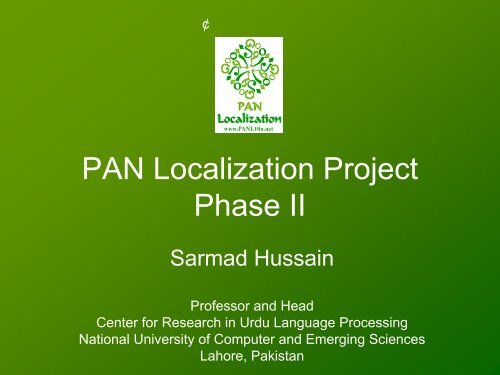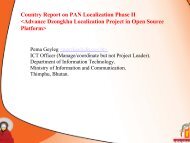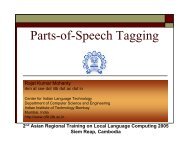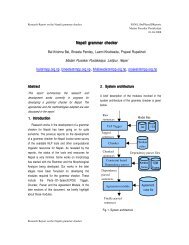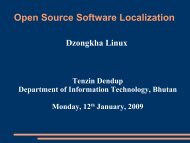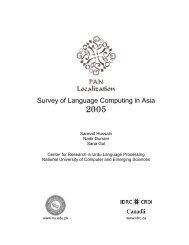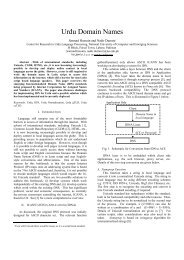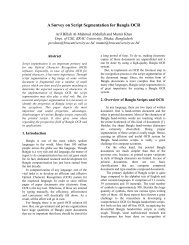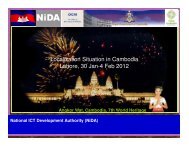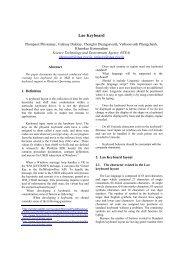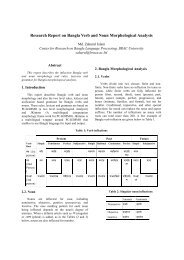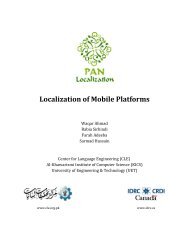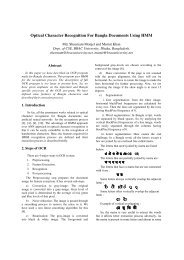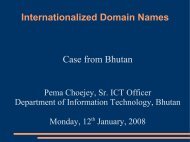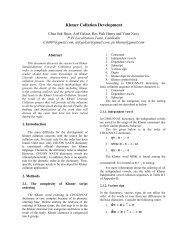Introduction - PAN Localization
Introduction - PAN Localization
Introduction - PAN Localization
Create successful ePaper yourself
Turn your PDF publications into a flip-book with our unique Google optimized e-Paper software.
¢<br />
<strong>PAN</strong> <strong>Localization</strong> Project<br />
Phase II<br />
Sarmad Hussain<br />
Professor and Head<br />
Center for Research in Urdu Language Processing<br />
National University of Computer and Emerging Sciences<br />
Lahore, Pakistan
Overview<br />
• Summary<br />
• Partners<br />
• Objectives<br />
• Scope<br />
• Structure<br />
•IPR
A Glance at<br />
<strong>PAN</strong> L10n Project Phase II<br />
Investigate effective, cohesive and sustainable mechanisms to<br />
develop and diffuse local language computing capacity<br />
across Asia<br />
May 2007 – Apr 2010<br />
CAD 2.7 Million<br />
10 Country Components<br />
18 Country Partners<br />
3 Regional Research Components<br />
15 Languages<br />
Coordinated by NUCES<br />
Funded by IDRC
Partners<br />
• Afghanistan<br />
– To be defined<br />
• Bangladesh<br />
– CRBLP at BRAC University<br />
– Development Research Network (D.Net)<br />
• Bhutan<br />
– Department of IT, Ministry of Communication (DIT), Govt. of Bhutan<br />
– Dzongkha Development Authority (DDA)<br />
• Cambodia<br />
– Ministry of Education (tentative), Govt. of Cambodia<br />
– Institute of Technology (ITC), Cambodia<br />
– National Information Development Agency (NIDA), Govt. of<br />
Cambodia<br />
• Laos<br />
– Science, Technology and Environment Agency (STEA), Govt. of<br />
Laos
Partners<br />
• Mongolia<br />
– Infocon<br />
– Mongolia University of Science and Technology (MUST)<br />
– National University of Mongolia (NUM)<br />
• Nepal<br />
– Madan Puraskar Pustakalaya (MPP)<br />
– E-Network Research and Development (ENRD)<br />
• Pakistan<br />
– CRULP at NUCES<br />
– Center for Entrepreneurship NUCES (tentative)<br />
• Sri Lanka<br />
– LTRL at University of Colombo School of Computing (UCSC)<br />
• TAR, China<br />
– Tentatively Tibet University (TU) (details to be defined)
Info-Structure<br />
Phase II<br />
Phase I<br />
End User<br />
Local Language<br />
Content<br />
Advanced End-User Access<br />
Applications in Local<br />
Language (e.g. TTS, OCR)<br />
Basic <strong>Localization</strong><br />
(e.g. Font, Keyboard, Localized OSS)<br />
End-User<br />
Training<br />
in Local<br />
Language<br />
Affordable Hardware<br />
Affordable Connectivity
Objectives<br />
1. Examine effective means to develop digital literacy through the<br />
use of local language computing and content<br />
2. Explore development of sustainable human resource capacity for<br />
R&D in local language computing as a means to raise current levels<br />
of technological support for Asian languages<br />
3. Advance culture and policy for development and use of local<br />
language computing and content<br />
4. Study and develop coherent instruments to gauge the<br />
effectiveness of multi-disciplinary research concerning the<br />
adoption of local language technology by rural communities
Scope: Digital Literacy<br />
• Research into issues related to content development<br />
and deployment<br />
– methods to determine local language content requirements<br />
– development of local language content<br />
– deployment of local language content<br />
– determine conventions used for publishing content<br />
– test related standards<br />
• Research into development and conduct of training to<br />
promote use<br />
– development of training materials for end-user groups<br />
– determining effective strategies to retrieve content<br />
– determining strategies to generate culturally-relevant content
Scope: HR and Technology<br />
Development<br />
• technology standards<br />
• language resources and computing<br />
• localization of mobile and open source platforms<br />
• localized multi-modal interfaces for end-users<br />
• human resource for R&D in language computing
Scope: Culture & Policy<br />
• regional network of researchers, practitioners<br />
and policy-makers<br />
• IPR issues related to software development,<br />
software localization and content<br />
• gender issues related to localization, training<br />
and content development<br />
• policy framework for language computing and<br />
local content
Scope: Evaluation<br />
• use OM and GEM II methodologies for<br />
planning, monitoring and evaluation<br />
• adapt OM for localization related projects<br />
• adapt GEMII for localization related projects<br />
• evaluate concurrent use of GEM II and OM
Structure and Channels<br />
Regional Secretariat<br />
Training<br />
Content<br />
Technology<br />
OM and GEMII<br />
Policy<br />
Regional Research<br />
Component<br />
Country<br />
Component<br />
Country<br />
Partner
• Software<br />
– FOSS<br />
• Microsoft<br />
• Linux<br />
• Content<br />
– Attribution<br />
– Re-distribution<br />
– Extension<br />
– Commercialization<br />
IPR
¢<br />
<strong>PAN</strong> <strong>Localization</strong> Project<br />
Phase II<br />
Sarmad Hussain<br />
Professor and Head<br />
Center for Research in Urdu Language Processing<br />
National University of Computer and Emerging Sciences<br />
Lahore, Pakistan


